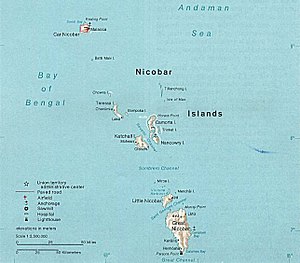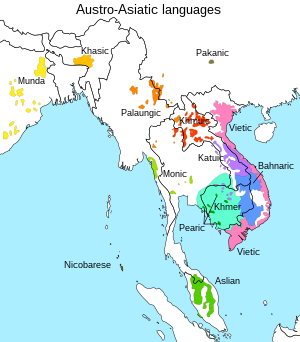Nicobarese languages
| Nicobarese | |
|---|---|
| Nicobaric | |
| Ethnicity | Nicobarese people |
| Geographic distribution | Nicobar Islands, India |
| Linguistic classification | Austroasiatic
|
| Proto-language | Proto-Nicobarese |
| Subdivisions | |
| Language codes | |
| Glottolog | nico1262 |
 The Nicobar Islands. Car is at top. | |
 Nicobarese | |
The Nicobarese languages or Nicobaric languages, form an isolated group of about half a dozen closely related Austroasiatic languages, spoken by most of the inhabitants of the Nicobar Islands of India. They have a total of about 30,000 speakers (22,100 native). Most Nicobarese speakers speak the Car language. Paul Sidwell (2015:179)[1] considers the Nicobarese languages to subgroup with Aslian.
The Nicobarese languages appear to be related to the Shompen language of the indigenous inhabitants of the interior of Great Nicobar Island (Blench & Sidwell 2011), which is usually considered a separate branch of Austroasiatic.[2] However, Paul Sidwell (2017)[3] classifies Shompen as a Southern Nicobaric language rather than as a separate branch of Austroasiatic.
The morphological similarities between Nicobarese and Austronesian languages have been used as evidence for the Austric hypothesis (Reid 1994).[4]
Languages
[edit]From north to south, the Nicobaric languages are:
- Car: Car (Pū)
- Chaura–Teressa: Chaura (Tutet/Sanënyö), Teressa (Taih-Long/Lurö)
- Central: Nancowry (Nang-kauri/Mūöt), Camorta, Katchal (Tehnu)
- Southern: Southern Nicobarese (Sambelong), Shompen (Shom Peng)
Classification
[edit]Paul Sidwell (2017) classifies the Nicobaric languages as follows.[3]
See also
[edit]- Shompen language
- List of Proto-Nicobarese reconstructions (Wiktionary)
References
[edit]- ^ Sidwell, Paul. 2015. "Austroasiatic classification." In Jenny, Mathias and Paul Sidwell, eds (2015). The Handbook of Austroasiatic Languages. Leiden: Brill.
- ^ Blench, Roger, and Paul Sidwell. 2011. "Is Shom Pen a Distinct Branch?" In Sophana Srichampa and Paul Sidwell, eds. Austroasiatic Studies: Papers from ICAAL 4. Canberra: Pacific Linguistics.
- ^ a b Sidwell, Paul. 2017. "Proto-Nicobarese Phonology, Morphology, Syntax: work in progress". International Conference on Austroasiatic Linguistics 7, Kiel, Sept 29-Oct 1, 2017.
- ^ Reid, Lawrence A. 1994. Morphological evidence for Austric. Oceanic Linguistics 33(2):323-344.
Further reading
[edit]- Adams, K. L. (1989). Systems of numeral classification in the Mon–Khmer, Nicobarese and Aslian subfamilies of Austroasiatic. Canberra, A.C.T., Australia: Dept. of Linguistics, Research School of Pacific Studies, Australian National University. ISBN 0-85883-373-5
- Radhakrishnan, R. (1981). The Nancowry Word: Phonology, Affixal Morphology and Roots of a Nicobarese Language. Current Inquiry Into Language and Linguistics 37. Linguistic Research Inc., P.O. Box 5677, Station 'L', Edmonton, Alberta, Canada, T6C 4G1. ISBN 0-88783-041-2
- Sidwell, Paul. 2018. Proto-Nicobarese phonology. In Papers from the Seventh International Conference on Austroasiatic Linguistics, 101-131. Journal of the Southeast Asian Linguistics Society Special Publication No. 3. University of Hawai’i Press.
